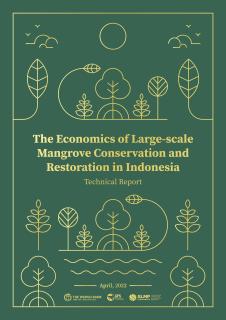
This report aims to support policymakers in providing a set of economically-sound policy scenarios to achieve greener, more resilient and inclusive development of Indonesia's mangroves ecosystems. The key policy message stemming from the study’s findings is that an efficient mix of mangrove restoration and conservation activities is needed.
Conservation of existing mangroves should be prioritized. Conservation net benefits are generally higher than restoration net benefits. Making the necessary investments will require adopting an integrated mangrove conservation, restoration and blue finance approaches.
